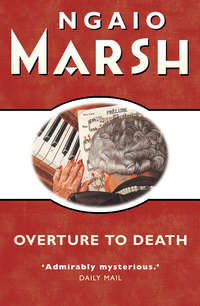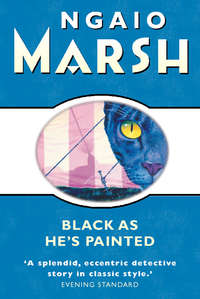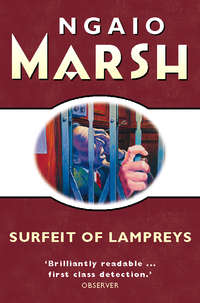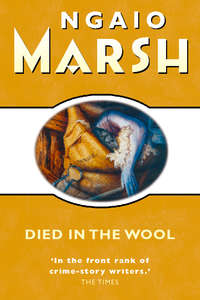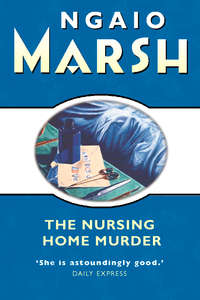
Полная версия
Death in Ecstasy
CHAPTER 3 Death of an Ecstatic Spinster
At first Nigel, though greatly startled, imagined that this performance was merely the climax of the ceremony. He found the whole business extremely unpleasant but was nevertheless interested. Perhaps a minute passed before he realized that the womanâs collapse was not anticipated by the congregation or by Father Garnette himself. A young man in the group of Initiates gave the first indication. He rose from his knees and stood looking from the woman to the priest. He spoke, but so quietly that Nigel could not hear what he said. The rest of the circle remained kneeling, but rather as though they had forgotten to rise or were stricken into immobility. The ecstatic fervour of the ceremony had quite vanished and something infinitely more disquieting had taken its place. The priest spoke. Perhaps because he had heard the words so often that evening, Nigel heard them then.
âSpiritual ecstasy â¦â He pronounced this word âecstasah.â âManifestation â¦â
The Initiate hesitated and looked fixedly at the prostrate figure.
âMy friends,â said the priest loudly, with an air of decision. âMy friends, our beloved sister has been vouchsafed the greatest boon of all. She is in ecstasy. Let us leave her to her tremendous experience. Let us sing our hymn to Pan, the God-in-all.â
He stopped. The organ uttered a tentative growl. The congregation, murmuring and uneasy, got to its feet.
âLet us sing,â repeated Jasper Garnette with determination, âthe hymn ââ
A scream rang out. The dowdy woman had broken away from the circle and stood with her head thrust forward and her mouth wide open.
âItâs not. Itâs not. Sheâs dead. I touched her. Sheâs dead!â
âMiss Wade, quiet!â
âI wonât be quiet! Sheâs dead.â
âWait a moment,â said a placid voice near Nigel. An elderly solid-looking man was working his way out of the row of pews. He pushed himself carefully past the large lady. Nigel moved out to make way for him and then, on a journalistic impulse, followed him up the aisle.
âI think I had better have a look at this lady,â said the man placidly.
âBut, Dr Kasbek ââ
âI think I had better have a look at her, Father Garnette.â
Nigel unobserved, came up with the group under the torch. He had the sensation of walking on to a stage and joining in the action of a play. They appeared a strange enough crew, white-faced and cadaverous looking in the uneven glare of the single flame. This made a kind of labial bubbling. It was the only sound. The doctor knelt by the prostrate figure.
She had fallen half on her face, and head downwards across the chancel steps. The doctor touched her wrist and then, with a brusque movement, pulled away the cap that hid her face. The eyes, wide open and protuberant, stared straight up at him. At the corners of the mouth were traces of a rimy spume. The mouth itself was set, with the teeth clenched and the lips drawn back, in a rigid circle. The cheeks were cherry-red, but the rest of the face was livid. She may have been in a state of ecstasy but she was undoubtedly dead.
On seeing this dreadful face, the Initiates who had gathered round drew back quickly, some with exclamations, some silently. The elderly drab lady, Miss Wade, uttered a stifled yelp in which there was both terror and, oddly enough, a kind of triumph.
âDead! I told you she was dead! Oh! Father Garnette!â
âCover it up for Godâs sake,â said the tall young man.
The doctor knelt down. He sniffed twice at the rigid lips and then opened the front of the dress. Nigel could see his hand pressed firmly against the white skin. He held it there for some time, seconds that seemed like minutes. Still bent down, he seemed to be scrutinising the womanâs face. He pulled the hat forward again.
âThis is turrible, turrible. This certainly is turrible,â murmured the commercial-looking gentleman, and revealed himself an American.
âYouâd better get rid of your congregation,â said the doctor abruptly. He spoke directly to the priest.
Father Garnette had said nothing. He had not moved. He still looked a striking enough figure, but the virtue had gone out of him. He did not answer.
âWill you tell them to go?â asked Dr Kasbek.
âWait a moment.â
Nigel heard his own voice with a sensation of panic. They all turned to him, not in surprise, but with an air of bewilderment. He was conscious of a background of suppressed murmurs in the hall. He felt as though his vocal apparatus had decided to function independently.
âHas this lady died naturally?â he asked the doctor.
âAs you see, I have only glanced at her.â
âIs there any doubt?â
âWhat do you mean?â demanded the priest suddenly, and then: âWho are you?â
âI was in the congregation. I am sorry to interfere, but if there is any suspicion of unnatural death I believe no one should ââ
âUnnatural death? Say, where dâyou get that idea?â said the American.
âItâs the mouth and eyes, and â and the smell. I may be wrong.â Nigel still looked at the doctor. âBut if thereâs a doubt I donât think anybody should leave.â
The doctor returned his look calmly.
âI think you are right,â he said at last.
They had none of them raised their voices, but something of what they said must have communicated itself to the congregation. A number of people had moved out into the centre aisle. The murmur had swelled. Several voices rang out loudly and suddenly a woman screamed. There was a movement, confused and indeterminate, towards the chancel.
âTell them to sit down,â said the Doctor.
The priest seemed to pull himself together. He turned and walked quickly up the steps into the pulpit. Nigel felt that he was making a deliberate effort to collect and control the congregation and to bend the full weight of his personality upon it.
âMy friendsâ â the magnificent voice rang out firmly â âWill you all return to your seats and remain quiet? I believe, I firmly believe that the great rushing powers of endless space have chosen this moment to manifest themselves. Their choice has fallen upon our beloved sister in ecstasy, Cara Quayne.â The voice wavered a little, then dropped a tone. âWe must strengthen our souls with the power of the Word. I call upon you to meditate upon the word âUnity.â Let there be silence among you.â
He was at once obeyed. A stillness fell upon the hall. The rustle of his vestments sounded loudly as he came down the steps from the pulpit. To Nigel he seemed a fabulous, a monstrous creature.
He turned to the two acolytes, who stood, the one mechanically swinging his censer, the other holding the jug of wine.
âDraw the chancel curtains,â whispered Father Garnette.
âYes, Father,â lisped the red-headed acolyte.
âYes, Father,â minced the dark acolyte.
A rattle of brass, the sweep of heavy fabric, and they were swiftly shut away from the congregation by a wall of thick brocade. The chancel became a room, torch-lit and rather horribly cosy.
âIf we speak low,â said Father Garnette, âthey cannot hear. The curtains are interlined and very thick.â
âFor Gardâs sake!â said the American. âThis is surely a turrible affair. Doctor, are you quite certain sheâs gone?â
âQuite,â answered the doctor, who had again knelt down by the body.
âYes, but thereâs more in it than that,â began the young man. âWhatâs this about no one leaving? What does it mean?â He swung round to Nigel. âWhy do you talk about unnatural death, and who the hell are you?â
âMaurice,â said Father Garnette. âMaurice, my dear fellow!â
âThis woman,â the boy went on doggedly, âhas no business here. She had no right to the Cup. She was evil. I know you â Father Garnette, I know.â
âMaurice, be quiet.â
âCan it, Pringle,â said the American.
âI tell you I know ââ The boy broke off and stared at the priest with a sort of frantic devotion. Father Garnette looked fixedly at him. If there was some sort of conflict between them the priest won, for the boy suddenly turned aside and walked away from them.
âWhat is it?â Nigel asked the doctor. âIs it poison?â
âIt looks like it, certainly. Death was instantaneous. We must inform the police.â
âIs there a telephone anywhere near?â
âI believe thereâs one in Father Garnetteâs rooms.â
âHis rooms?â
âBehind the altar,â said the doctor.
âThen â may I use it?â
âIs that absolutely necessary?â asked the priest.
âAbsolutely,â said Dr Kasbek. He looked at Nigel. âWill you do it?â
âI will if you like. I know a man at the Yard.â
âDo. What about the nearest relative? Anybody know who it is?â
âShe lives alone,â said a girl who had not spoken before. âShe told me once that she had no relations in England.â
âI see,â said Dr Kasbek. âWell, then, perhaps youâ â he looked at Nigel â âwill get straight through to the police. Father Garnette, will you show this young man the way?â
âI had better return to my people, I think,â replied Father Garnette. âThey will need me. Claude, show the way to the telephone.â
âYes, Father.â
In a kind of trance Nigel followed the dark acolyte up the sanctuary steps to the altar. The willowy Claude drew aside a brocaded curtain to the left of the altar and revealed a door which he opened and went through, casting a melting glance upon Nigel as he did so.
âNasty little bit of work,â thought Nigel, and followed him.
Evidently Father Garnette lived behind the altar. They had entered a small flat. The room directly behind was furnished as a sort of mythological study. This much he took in as Claude glided across the room and snatched up something that looked like a sacramental tea-cosy. A telephone stood revealed.
âThank you,â said Nigel, and hoped Claude would go away. He remained, gazing trustfully at Nigel.
Sunday evening. Unless he had an important case on hand, Alleyn ought to be at home. Nigel dialled the number and waited, conscious of his own heart-beat and of his dry mouth.
âHullo!â
âHullo â May I speak to Chief Detective-Inspector Alleyn? Oh, itâs you. You are in, then. Itâs Nigel Bathgate here.â
âGood evening, Bathgate. Whatâs the matter?â
âIâm ringing from a hall, the â the House of the Sacred Flame in Knocklatchers Row off Chester Terrace, just opposite my flat.â
âI know Knocklatchers Row. Itâs in my division.â
âA woman died here ten minutes ago. I think youâd better come.â
âAre you alone?â
âNo.â
âYou wretched young man, whatâs the matter with you? Is the lady murdered?â
âHow should I know?â
âWhy the devil didnât you ring the Yard? I suppose Iâd better do it.â
âI think you ought to come. Iâm holding the congregation. At least,â added Nigel confusedly, âthey are.â
âYou are quite unintelligible. Iâll be there in ten minutes.â
âThank you.â
Nigel hung up the receiver.
âFancy you knowing Alleyn of Scotland Yard,â fluted Claude. âHow perfectly marvellous! You are lucky.â
âI think we had better go back,â said Nigel.
âIâd much rather stay here. Iâm afraid. Did you ever see anything so perfectly dreadful as Miss Quayneâs face? Please do tell me â do you think itâs suicide?â
âI donât know. Are you coming?â
âVery well. You seem to be a terrifically resolute sort of person. Iâll turn the light out. Isnât Father Garnette marvellous? Youâre new, arenât you?â
Nigel dived out of the door.
He found the Initiates grouped round the American gentleman, who seemed to be addressing them in a whisper. He was a type that is featured heavily in transatlantic publicity, tall, rather fat and inclined to be flabby, but almost incredibly clean, as though he used all the deodorants, mouth washes, soaps and lotions recommended by his prototype who beams pep from the colour pages of American periodicals. The only irregularities in Mr Ogden were his eyes, which were skewbald â one light blue and one brown. This gave him a comic look and made one suspect him of clowning when he was most serious.
To Nigelâs astonishment the organ was playing and from beyond the curtains came a muffled sound of singing. Father Garnetteâs voice was clearly distinguishable. Someone, the doctor perhaps, had covered the body with a piece of gorgeously embroidered satin.
When he saw Nigel the American gentleman stepped forward.
âIt appears to me we ought to get acquainted,â he said pleasantly. âYou kind of sprang up out of no place and took over the works. Thatâs OK by me, and Iâll hand it to you. I certainly appreciate prompt action. My nameâs Samuel J. Ogden. I guess Iâve got a card somewhere.â The amazing Mr Ogden actually thrust his hand into his breast pocket.
âPlease donât bother,â said Nigel. âMy name is Bathgate.â
âPleased to meet you, Mr Bathgate,â said Mr Ogden, instantly shaking hands. âAllow me to introduce these ladies and gentlemen. Mrs Candour, meet Mr Bathgate. Miss Wade, meet Mr Bathgate. Mr Bathgate, Miss Janey Jenkins. Monsieur de Ravigne, Mr Bathgate. Dr Kasbek, Mr Bathgate. Mr Maurice Pringle, Mr Bathgate. And these two young gentlemen are our acolytes. Mr Claude Wheatley and Mr Lionel Smith, meet Mr Bathgate.â
The seven inarticulate Britishers exchanged helpless glances with Nigel. M de Ravigne, a sleek Frenchman, gave him a scornful bow.
âWell now ââ began Mr Ogden with a comfortable smile.
âI think, if you donât mind,â said Nigel hurriedly, âthat someone should go down to the front door. Inspector Alleyn is on his way here, and as things are at the moment he wonât be able to get in.â
âThatâs so,â agreed Mr Ogden. âMaybe one of these boys ââ
âOh, do let me go,â begged Claude.
âFine,â said Mr Ogden.
âIâll come with you, Claude,â said the red-headed acolyte.
âThereâs no need for two, honestly, is there Mr Ogden?â
âOh, get to it, Fauntleroy, and take little Eric along!â said Mr Ogden brutally. Nigel suddenly felt that he liked Mr Ogden.
The acolytes, flouncing, disappeared through the curtain. The sound of organ and voices was momentarily louder.
âDo acolytes have to be that way?â inquired Mr Ogden of nobody in particular.
Somebody laughed attractively. It was Miss Janey Jenkins. She was young and short and looked intelligent.
âIâm sorry,â she said immediately. âI didnât mean to laugh, only Claude and Lionel are rather awful, arenât they?â
âI agree,â said Nigel quickly.
She turned, not to him, but to Maurice Pringle, the young man who had spoken so strangely to the priest. He now stood apart from the others and looked acutely miserable. Miss Jenkins went and spoke to him, but in so low a voice that Nigel could not hear what she said.
âDr Kasbek,â said the little spinster whom Mr Ogden had called Miss Wade, âDr Kasbek, I am afraid I am very foolish, but I do not understand. Has Cara Quayne been murdered?â
This suggestion, voiced for the first time, was received as though it was a gross indecency. Mrs Candour a peony of a woman, with ugly hands, uttered a scandalized yelp; M de Ravigne hissed like a steam-boiler; Mr Ogden said: âWait a minute, wait a minuteâ; Pringle seemed to shrink into himself, and Janey Jenkins took his hand.
âSurely not, Miss Wade,â said Dr Kasbek. âLet us not anticipate such a thing.â
âI only inquired,â said Miss Wade. âShe wasnât very happy, poor thing, and she wasnât very popular.â
âMiss Wade â please!â M de Ravigne looked angrily at the little figure. âI must protest â this is a â a preposterous suggestion. It is ridiculous.â He gesticulated eloquently. âIs it not enough that this tragedy should have arrived? My poor Cara, is it not enough!â
The voice of Father Garnette could be heard, muffled but sonorous, beyond the curtains.
âListen to him!â said Pringle. âListen! Heâs keeping them quiet. Heâs kept us all quiet. What are we to believe of him?â
âWhat are you talking about?â whispered Mrs Candour savagely.
âYou know well enough. Youâd have taken her place if you could. Itâs not his fault â itâs yours. Itâs all so â so beastly ââ
âMaurice,â said Miss Jenkins softly.
âBe quiet, Janey. I will say it. Whatever it is, itâs retribution. The whole thingâs a farce. I canât stand it any longer. Iâm going to tell them ââ
He broke away from her and ran towards the curtains. Before he reached them they parted and a tall man came through.
âOh, there you are, Bathgate,â said Chief Detective-Inspector Alleyn. âWhatâs the trouble?â
CHAPTER 4 The Yard
The entrance of Chief Detective-Inspector Alleyn had a curious effect upon the scene and upon the actors. It was an effect which might be likened to that achieved by the cinema when the camera is shifted and the whole scene presented from a different viewpoint. Nigel had felt himself to be involved in a nightmare, but it now seemed to be someone elseâs nightmare of which he was merely the narrator. He wondered wildly whether he should follow Mr Ogdenâs example and embark on an elaborate series of introductions. However, he avoided this complication and in as few words as possible told Alleyn what had happened. The others remained silent, eyeing the inspector. Janey Jenkins held Pringleâs hand between her two hands; Miss Wade kept a handkerchief pressed against her lips; M.de Ravigne stood scornfully apart; Mrs Candour had collapsed into a grand-opera throne on the left of the altar; Mr Ogden looked capable and perturbed and the two acolytes gazed rapturously at the inspector. Alleyn listened with his curious air of detachment that always reminded Nigel of a polite faun. When Nigel came to the ecstatic frenzy, Alleyn made a slantwise grimace. Speaking so quietly that the others could not overhear him, Nigel repeated as closely as he could remember them the exclamations made by Pringle, Miss Wade and de Ravigne. Alleyn asked for the names of persons who should be informed. Beyond Miss Quayneâs servants there seemed to be nobody. Miss Jenkins, appealed to, said she had overheard Miss Quayne saying that her staff were all out on Sunday evening. She volunteered to ring up and find out and retired to Father Garnetteâs room to do so. She returned to say there was no answer. Alleyn took the number and said he would see the house was informed later. As soon as he had learnt the facts of the case, Alleyn lifted the satin drapery and looked at the distorted face beneath it, spoke a few words aside to Dr Kasbek, and then addressed them all quietly. At this moment Father Garnette, having set his congregation going on another hymn, returned to the group. Nigel alone noticed him. He stood just inside the curtains and never took his eyes off the inspector.
Alleyn said: âThere is, I think, no reason why you should not know what has happened here. This woman has probably died of poisoning. Until we know more of the circumstances and the nature of her death I shall have to take over the case on behalf of the police. From what I have heard I believe that there is nothing to be gained in keeping the rest of the congregation here.â He turned slightly and saw the priest.
âYou are Mr Garnette? Will you be good enough to ask your congregation to go home â when they have quite finished singing, of course. I have stationed a constable inside the door. He will take their names. Just tell them that, will you?â
âCertainly,â said Father Garnette and disappeared through the curtains.
They heard him pronounce a benediction of sorts. Beyond the curtains there was a sort of stirring and movement. One or two people coughed. It all died away at last. A door slammed with a desolate air of finality and there was complete silence in the building, save for the slobbering of the torch. Father Garnette returned.
âPhew!â said Alleyn. âLetâs have the curtains drawn back, may we?â
Father Garnette inclined his head. Claude and Lionel flew to the sides of the chancel and in a moment the curtains rattled apart, revealing the solitary figure of the doorkeeper, agape on the lowest step.
âIs there anything I can do, Father?â asked the doorkeeper.
âLock the front door and go home,â said Father Garnette.
âYes, Father,â whispered the doorkeeper. He departed hurriedly pulling the double doors to with an apologetic slam. For a moment there was silence. Then Alleyn turned to Nigel.
âIs there a telephone handy?â
âYes.â
âGet through to the Yard, will you, Bathgate, and tell them what has happened. Fox is on duty. Ask them to send him along with the usual support. Weâll want the divisional surgeon and a wardress.â
Nigel went into the room behind the altar and delivered this message. When he returned he found Alleyn, with his notebook in his hand, taking down the names and addresses of the Initiates.
âItâs got to be done, you see,â he explained. âThere will, of course, be an inquest and Iâm afraid you will all be called as witnesses.â
âOh, God,â said Pringle with a snort of disgust.
âIâd better start with the deceased,â Alleyn suggested. âWhat is her name, please?â
âShe was a Miss Cara Quayne, Inspector,â said Mr Ogden. âShe owned a very, very distinctive residence in Shepherd Market, No.101. I have had the honour of dining at the Quayne home, and believe me it surely was an aesthetic experience. She was a very lovely-natured woman with a great appreciation of the beautiful ââ
âNo. 101 Shepherd Market,â said Alleyn. âThank you.â He wrote it down and then glanced round his audience.
âI will take yours first if I may, Doctor Kasbek.â
âCertainly. Nicholas Kasbek, 189a Wigmore Street.â
âRight.â He turned to Miss Wade.
âMy name is Ernestine Wade,â she said very clearly and in a high voice, as though Alleyn was deaf. âI live at Primrose Court, Kingâs Road, Chelsea. Spinster.â
âThank you.â
Miss Jenkins came forward.
âIâm Janey Jenkins. I live in a studio flat in Yeomans Row, No.99d. Iâm a spinster too, if you want to know.â
âWell,â said Alleyn, âjust for âMissâ or âMrs,â you know.â
âNow you, Maurice,â said Miss Jenkins.
âPringle,â said that gentleman as though the name was an offence. âMaurice. Iâm staying at 11 Harrow Mansions, Sloane Square.â
âIs that your permanent address?â
âNo. Havenât got one unless you count my peopleâs place. I never go there if I can help it.â
âThe Phoenix Club will always find you, wonât it?â murmured Miss Jenkins.
âOh, God, yes,â replied Mr Pringle distastefully.
âNext please,â said Alleyn cheerfully. Mrs Candour spoke suddenly from the ecclesiastical throne. She had the air of uttering an appalling indecency.
âMy name is Dagmar Candour. Mrs. Queen Charlotte Flats, Kensington Square. No.12.â
âC.a.n. â ?â queried Alleyn.
âd.o.u.r.â
âThank you.â
Mr Ogden, who had several times taken a step forward and as often politely retreated, now spoke up firmly.




